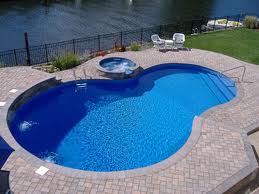
 What a beautiful week we’ve had! Spring has come in like a lion and for those of you with swimming pools, it’s time to break out the trunks, pull back the solar cover and dive in.
What a beautiful week we’ve had! Spring has come in like a lion and for those of you with swimming pools, it’s time to break out the trunks, pull back the solar cover and dive in.
Pools present an interesting conundrum to the real estate agent. In terms of property value, they seem to neither add nor detract from the value of a property. Generally, they are a matter of personal preference on the part of the buyer. Pricing your house higher because it has a pool is not necessarily a feasible option, however, advertising that the property includes a pool may be a huge draw for a buyer that may not be as keen on buying a comparable property without one.
Hot tubs, on the other hand, generally add value to a home especially if they are esthetically pleasing and well maintained. They don’t take up too much space and allow you to still have a yard, while providing a certain ambiance that most buyers find appealing.
When talking pools, one of the first things that comes to mind is liability. According to a local insurance agent, there are two key precautions you can take to protect yourself in the case of a pool accident.
• Buy an Umbrella Policy. An umbrella policy allows you to purchase additional laibility insurance covering you in the case of an accident both on your property or in your car. Liability insurance is designed to protect your home from being used to settle a lawsuit. In case of a fatality or serious accident, you want to make sure you carry enough liability insurance to at least cover the value of your assets. i.e. your home. Most home owner insurance policies only cover $300,000, whereas umbrella policy coverage starts at $1 million, and will only cost you in the neighborhood of $250 to $400 per year.
• Comply with all city codes. Every city will have its own set of building codes and rules concerning pools. These codes are often updated as new information becomes available relating to the safety of backyard pools. It is your job to find out what you need to do to prevent your pool from becoming an attractive nuisance. For example, 10 years ago the code may have called for a perimeter fence with a lock to prevent unauthorized entry to your property. Now, it may also state that you need to have a 4-foot safety fence directly around the pool. Even if your house is grandfathered and only complies with the old code, you could find yourself in hot water if you experience a fatality or serious injury in your pool beause the building codes have changed.
If you would like a personalized market analysis on your home and/or If I can help you find the home of your dreams, please contact me at [email protected] or at 310-259-7419.





A really good answer!